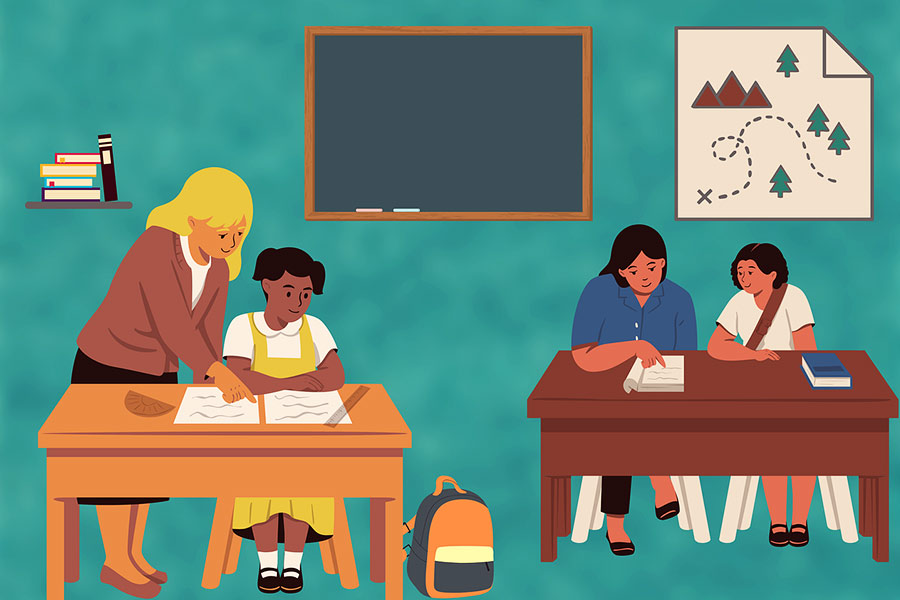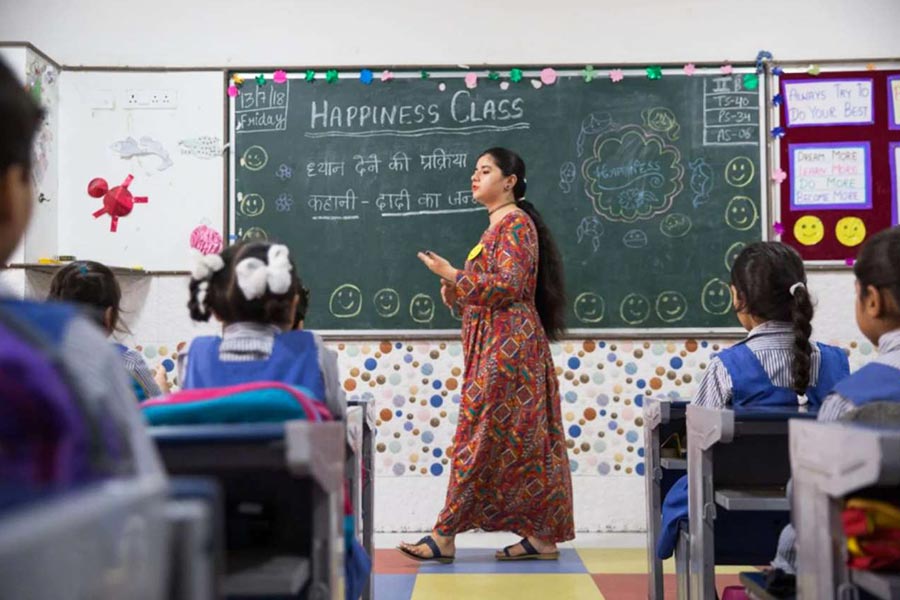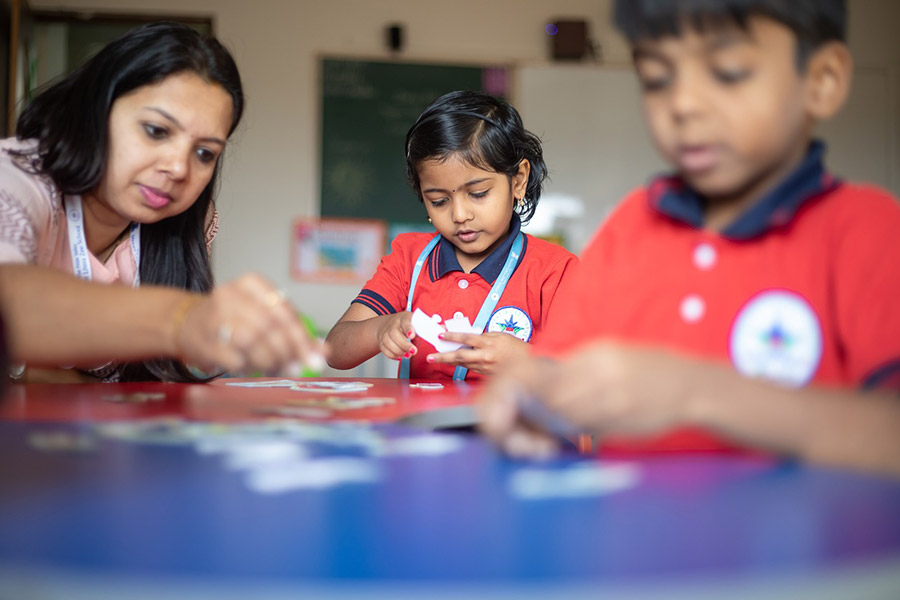Imagine the daily routine of a teacher — waking up early to plan lessons, standing for hours in front of eager faces, managing administrative tasks, and navigating the complexities of parent-teacher meetings. Evenings are often spent grading assignments and preparing for the next day, while weekends — supposedly a time for rest and relaxation— are largely consumed by school events and training sessions. This relentless cycle leaves many teachers on the verge of burnout.
During my time as a Teach For India fellow, I saw the immense challenges faced by teachers up close. I observed teachers who spent most of their day on their feet, tirelessly teaching class after class, often without the luxury of a proper break. I remember the exhaustion in their eyes as they corrected papers during their lunch hours, knowing that their timetable was packed with six to seven classes daily. I saw the frustration when they were assigned non-teaching duties like election postings, duties that pulled them away from their students and classrooms. And when the Covid-19 pandemic struck, I saw how teachers were expected to step into the roles of frontline workers, managing vaccination counts on top of their already overwhelming workloads.
This is the reality for 9.5 million teachers across India, working in 1.48 million schools. The State of Teachers, Teaching and Teacher Education in India 2023 (SoTTTER 2023) reveals that 40 per cent of government school teachers feel overwhelmed with their workload, which includes data maintenance and administrative duties. The situation isn’t much better in the private sector, where 18 to 20 per cent of teachers express similar feelings of being overwhelmed. For both groups, 24 to 25 per cent report that this burden has significantly impacted their mental and physical health. Alarmingly, 38 per cent of government teachers and 25 per cent of private teachers lack adequate support networks, leaving them to navigate these challenges in isolation.
So, if we expect teachers to care for our children, who is caring for the teachers?
What is SEL and how does it matter for teachers?
Social-Emotional Learning (SEL), which emphasises the importance of understanding and managing emotions, building healthy relationships and developing social awareness, isn’t just for students. It’s a lifeline for teachers, too. As an SEL consultant during the Covid-19 pandemic, I trained teachers on trauma-informed care. Through countless conversations, I identified the burnout and emotional exhaustion they were experiencing. SEL initiatives were almost always student-focussed, with teachers expected to implement these strategies. And yet, rarely was there a focus on their own emotional well-being.
My master’s dissertation deepened my understanding of this issue. I studied how a teacher’s social-emotional competence directly affects the classroom climate, and the findings were clear — teachers play a pivotal role in shaping how a child feels and learns. When teachers are burned out and lack the skills to manage their stress, it negatively impacts students’ joy and learning experience. This reinforced my belief that we urgently need to support our teachers. They cannot be expected to be everything at once — educators, counsellors, administrators — without proper support.
When teachers develop strong SEL skills, they are better equipped to understand and respond to their students’ emotional needs. They can recognise signs of distress, offer the necessary support and create a classroom environment where students feel safe and valued. This improves student behaviour and enhances academic performance. Moreover, teachers with strong SEL skills are more likely to enjoy their jobs, stay in their careers longer and avoid burnout. In a profession plagued by high stress and turnovers, focusing on SEL could be a game-changer, leading to a more stable and fulfilling teaching environment.
How to execute teacher-focussed SEL initiatives

Teacher training programmes across India should be revised to incorporate SEL Pixabay
India faces an urgent need to integrate SEL into BEd programmes as well as teacher training. This means revising BEd curricula to include SEL with a focus on emotional resilience and stress management. We must embed well-being practices into ongoing teacher training programmes, incorporating mindfulness, time management and stress-reduction techniques.
SEL cannot be meaningfully carried out in the absence of school counsellors and peer support groups. Throughout my experience, I’ve seen teachers carrying the emotional burdens of their students, often with little to no support. Schools should hire trained counsellors who can provide direct support to both students and teachers. Regular SEL workshops and peer support groups should be put in place to foster a community where teachers can share experiences and coping strategies, alleviating some of their emotional strain.
The next step is simplifying access to SEL resources. I have noticed that SEL is referred to by various names — such as life skills, 21st century skills, and holistic education — which creates confusion about its purpose and practice. To address this, we need to develop and provide clear, accessible resources. Offering practical tools like blogs, videos and toolkits that define and demonstrate SEL practices will help teachers integrate these essential skills effectively into their classrooms and personal lives.
Parents are also a vital stakeholder when it comes to teachers and their students. Engaged parents and a positive work environment are critical to teacher satisfaction and effectiveness. Structured Parent-Teacher Meetings (PTMs) and School Management Committee (SMC) meetings should not just focus on academic performance but also include discussions around student and teacher well-being. These conversations can gradually build a deeper understanding among parents and communities about the pressures teachers face and the importance of supporting their emotional health.
Lastly, students must be taught about the impact of their actions on the well-being of teachers. Teaching students to understand the emotional impact of their actions on teachers can create a more empathetic and cooperative classroom environment, ultimately contributing to a healthier and more supportive school culture.
Prevalent school culture can lead to superficial and misaligned implementation of SEL

Mental health remains stigmatised in India, complicating efforts to support teacher well-being TT archives
Implementing teacher-focused SEL interventions is not without its challenges. Mental health remains stigmatised in India, complicating efforts to support teacher well-being. Additionally, the shortage of trained mental health professionals and limited budgets further hinder these initiatives. Compounding the problem is how the prevalent school culture does not prioritise SEL, leading to its superficial or misaligned implementation.
Despite these obstacles, I believe that the long-term benefits of investing in teacher SEL far outweigh the challenges. A well-supported teacher is more likely to be effective, motivated and capable of inspiring students. By prioritising teacher well-being, we can ensure that educators are not just surviving but thriving in their roles.
Let’s make teacher well-being a priority — not just on Teachers’ Day, but every single day.
Aakanksha Agrawal is an experienced educator specialising in Social-Emotional Learning (SEL). She holds an MEd in the Psychology of Education from the University of Manchester. She is also the founder of It's Not a Child’s Play, a platform dedicated to SEL for all

